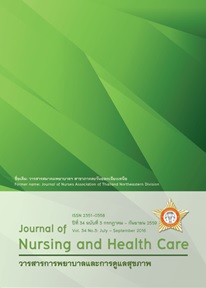การพัฒนาหลักสูตรสร้างเสริมสมรรถนะสากลสำหรับนักศึกษาพยาบาลศาสตรบัณฑิต Curriculum Development to Strengthen Global Competency for Nursing Students
คำสำคัญ:
สมรรถนะสากลของนักศึกษาพยาบาล หลักสูตรรายวิชา วิจัยอนาคตแบบ EDFR global competency, nursing students, subject curriculum, ethnography Delphi futures techniqueบทคัดย่อ
บทคัดย่อ
การวิจัยและพัฒนานี้ มีจุดประสงค์เพื่อ 1) ศึกษาองค์ประกอบของสมรรถนะสากล 2) พัฒนาหลักสูตรรายวิชาสร้างเสริม
สมรรถนะสากลและ 3) ศึกษาประสิทธิผลของหลักสูตรรายวิชาสร้างเสริมสมรรถนะสากล แบ่งการดำเนินงานเป็น 2 ระยะ
คือระยะที่ 1 ศึกษาองค์ประกอบของสมรรถนะสากลสำหรับนักศึกษาพยาบาลด้วยวิธีการวิจัยอนาคตแบบ EDFR 3 รอบ
ผู้ให้ข้อมูลหลักคือผู้เชี่ยวชาญจำนวน 21 คนได้โดยการเลือกอย่างเจาะจงตามคุณสมบัติที่กำหนด จาก 3 กลุ่ม ดังนี้ 1) กลุ่มผู้เชี่ยวชาญด้านการศึกษาพยาบาล 6 คน 2) ด้านปฏิบัติการพยาบาล 8 คน และ 3) ด้านผู้บริหารการพยาบาลหรือกรรมการจากสภาวิชาชีพพยาบาลรวม 7 คน เครื่องมือเป็นแบบสัมภาษณ์กึ่งโครงสร้างในรอบที่ 1 และแบบสอบถามแบบมาตรประมาณค่า 5 ระดับในรอบที่ 2 และ 3 วิเคราะห์ข้อมูลโดยการวิเคราะห์เชิงเนื้อหา ค่ามัธยฐาน (Med) และค่าพิสัยระหว่างควอไทล์ (IQR)ระยะที่ 2 การพัฒนาหลักสูตรรายวิชาสรา้ งเสริมสมรรถนะสากลดา้ นภาวะผูน้ ำและการจัดการ และดา้ นเทคโนโลยีสารสนเทศมี 2 ขั้นตอน ขั้นที่ 1 พัฒนาหลักสูตรรายวิชาฉบับร่าง ผ่านการตรวจสอบคุณภาพด้วยวิธีสนทนากลุ่ม จำนวน 6 คน ขั้นที่2 ศึกษาประสิทธิผลของหลักสูตร กลุ่มตัวอย่างเป็นนักศึกษาพยาบาลศาสตรบัณฑิตชั้นปีที่ 2 จำนวน 30 คนได้จากการสุ่มอย่างง่าย เครื่องมือที่ใช้ในการวิจัยประกอบด้วย 1) เอกสารหลักสูตรรายวิชา 2) แบบประเมินสมรรถนะสากลตามการรับรู้ของนักศึกษา และ 3) แบบประเมินความพึงพอใจตอ่ หลักสูตรรายวิชา แบบแผนการวิจัยเปน็ แบบกลุม่ เดียวทดสอบกอ่ นและหลังทดลอง วิเคราะห์ข้อมูลโดยใช้สถิติเชิงพรรณนา และ Paired t-testผลการวิจัยสรุปได้ดังนี้ 1) สมรรถนะสากลสำหรับนักศึกษาพยาบาลศาสตรบัณทิต ประกอบด้วยองค์ประกอบ 6 ด้านคือ (1) ด้านวิชาชีพ (2) ด้านภาวะผู้นำและการจัดการ (3) ด้านเทคโนโลยีสารสนเทศ (4) ด้านวัฒนธรรม (5) ด้านการสื่อสารและ (6) ดา้ นจริยธรรมและจิตสาธารณะ มีองคป์ ระกอบยอ่ ย 66 ขอ้ ผูเ้ ชี่ยวชาญมีฉันทามติวา่ แนวโนม้ สมรรถนะสากลมีความสำคัญในระดับมากขึ้นไป (Med ≥ 3.5) เป็นสมรรถนะสากลที่มีความสำคัญระดับมากที่สุด 51 ข้อ ระดับความสำคัญ มาก15 ข้อ ซึ่งผู้เชี่ยวชาญมีความเห็นสอดคล้องกันในแต่ละแนวโน้ม 2) หลักสูตรรายวิชาสร้างเสริมสมรรถนะสากลสำหรับนักศึกษาพยาบาลศาสตรบัณฑิตจำนวน 2 หน่วยกิต ประกอบด้วย 6 องค์ประกอบคือ (1) หลักการและเหตุผล (2) จุดมุ่งหมายรายวิชา (3) เนื้อหาสาระ (4) กิจกรรมการเรียนรู้ (5) สื่อการเรียนรู้ และ (6) การวัดและประเมินผล ประสิทธิผลของหลักสูตรรายวิชาที่พัฒนาขึ้น พบวา่ นักศึกษาพยาบาลที่ไดเ้ รียนรูด้ ว้ ยหลักสูตรรายวิชาสรา้ งเสริมสมรรถนะสากลมีคา่ เฉลี่ยของสมรรถนะสากล ( = 3.92) สูงกว่าค่าเฉลี่ยก่อนการเรียนรู้ ( = 3.49) อย่างมีนัยสำคัญทางสถิติที่ระดับ .05
Abstract
The objectives for this research were 1) to explore the global competency components for nursing students 2) to develop a subject curriculum to strengthen global competency in leadership, management competence and information technology competence for nursing students 3) to study an effectiveness of the developed curriculum.There were 2 phases of this study: Phase 1: Study of the global competency components for nursing students,
by analyzing related documents, and using the Ethnographic Delphi Futures Research (EDFR) technique. Data were collected 3 rounds. Twenty one experts were selected by specific criteria of knowledge and experience in the nursing professional, who were willing to participate in the research. There were 6 experts from nursing education, 8 professional nurses and 7 nursing administrators or committees in the professional nursing organizations, or policy maker in health organizations. The first round was conducted by using interview form, the second and third rounds were the rating scales questionnaires. The data were analyzed by content analysis,median (Med) and interquartile range (IQR). Phase 2: The subject curriculum was developed to strengthen global competency in Leadership and Management Competence, and Information technology Competence. The quality of draft curriculum development was checked by group discussion. A subject curriculum validated by 6 experts and then studied an effectiveness. The sample were 30 nursing second year students, in Boromarajonani College of Nursing Nakhon Phanom. The experiment employed one group pretest – posttest design. The research instruments were composed of 1) The subject curriculum 2) the Global competency questionnaire and 3) Satisfaction uestionnaire. Data were analyzed using descriptive statistics and Paired t – test The results revealed that: 1) Nursing students’ Global competency rated by the experts, were classified in to 6 components. (1) Professional nursing care (2) Leadership and Management competence (3) Information technology competence (4) Cultural Understanding (5) Communication (6) Ethic and Public Mind Six components of Global Competency composed of 66 items: 51 items were rated as most important, and 15 items were rated as very important.2) A written curriculum to strengthen Global Competency was a two credit syllabus of 6 elements: (1) Rationale,(2) Objectives, (3) Content structure, (4) Learning Activity, (5) Learning materials, and (6) Assessment and Evaluation.3) The efficiency of the syllabus after the implementation was found that the Mean value of students’ Global Competency was significantly higher than before the implementation at .05 level.



